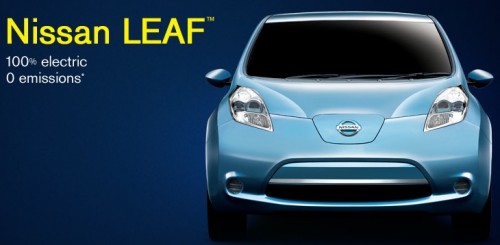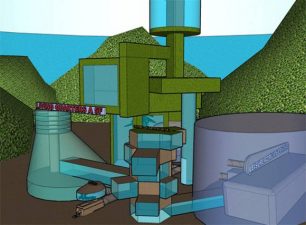Nissan’s all-electric LEAF gives a run for Volt’s and Better Place’s money. Nissan has no plans, however, to target infrastructure-poor Middle East.
The battle over which company will market the first practical electric car is becoming more intense with the introduction of Nissan’s new total electric LEAF model. The Japanese carmaker is marketing this new entry into the electric car market as being one which is totally electric, as compared to hybrids and GM’s Volt model (which also has two engines, even though the gasoline one is only used for charging the batteries for the electric engine). I’ve compared the Chevy Volt to Better Place’s Renault prototype model, and pointed out the differences between the two concepts.
Th Better Place-Renault model can travel for around 160 km or 100 miles on a single charge, and then can either be recharged at a plug-in “charging post” or simply driven onto a lift or special platform, where its lithium ion or “Li-ion” batteries will exchanged for newly charged ones in a matter of minutes. How does this compare to the LEAF? And will the LEAF be available to curious readers living in the Middle East? Apparently not, says Nissan’s CEO.
Nissan, which is a partner with Renault, seems to have jumped the gun on the French carmaker, which is also going to be selling Z.E. (zero emission) total electric cars in 2011.
Although not mentioned specifically in their advertisements, both Nissan and Renault may very will be using electric car technology designed by Better Place, which involves the above mentioned battery exchange stations, allowing drives much more driving “range”.
The Leaf is being marketed as a more affordable electric car, which besides having the same “between charges” driving range as the Volt also offers an IT global information technology, which will “connect” drivers to a global data center, to provide support, information, and entertainment for drivers 24 hours a day.
The car will also have an on-board remote-controlled timer can also be pre-programmed to recharge batteries.
Video on Nissan’s LEAF, what it looks like and how it works.
[youtube width=”560″ height=”400″]http://www.youtube.com/watch?v=f48x9baSuF0[/youtube]
The LEAF will first be manufactured at Nissan’s Oppama Japan plant, and will later be made elsewhere, including at a large facility in the American state of Tennessee. Although the car will be available through Nissan’s world-wide network of importers and dealerships, the success of owning one will depend on the accessibility of charging stations or “posts,” many of which are being planned to be installed in places like parking lots at shopping malls, train and other public transport stations, as well as in parking spaces in housing complexes.
A full battery charge takes about 8 hours, using a 200 volt current; but ‘quick charges’ for batteries not completely drained will be able to recharge a battery sufficiently enough in 30 minutes to get home from work or from the mall.
No room for a green leaf
Availability in Middle Eastern countries will depend on modernity of cities and residential neighbourhoods. So far Nissan has decided that countries that aren’t environmentally aware won’t be a target, and that includes Abu Dhabi. Abu Dhabi’s National reports that there will be “No place for a green leaf in the desert.”
In the National, Carlos Ghosn, the chief executive officer of Nissan and Renault, was in Abu Dhabi for the global launch of the 2010 Nissan Patrol 4×4 vehicle. And while he said the Middle East was shaping up to be “the main market” for the Patrol, the reverse is true of Nissan’s forthcoming electric Leaf car.
His words:
“The Middle East is not a prime target for electric vehicles,” Mr Ghosn said at a press conference, citing a lack of government interest in the region for zero-emission cars. “We give priority to governments who are ready to provide incentives for electric cars, like infrastructure,” he said.
::Nissan
Read more on electric cars:
GM ‘s Volt vs Better Place’s Renault Electric Version
Build Your Own Electric Car
Denmark Set to Spotlight Electric Cars at Global Climate Change Conference




If Iran is the second major oil producer, the Iranians must wonder where all their oil money is going. I would, if my country was making at that oil, and I wasn't making enough to buy a white gold mercedes (even if faux gold). http://www.greenprophet.com/2010/03/02/18004/wh…Of course I am jesting. Not sure if I believe in peak oil.
But let's remember that not all Middle East countries are oil rich. There is Israel, Syria, Lebanon, Jordan… no oil. Qatar's economy is based on natural gas. The major oil players are the Saudis, Iran, UAE, Iraq, and Kuwait. If we could get the oil-less to think cleaner, there'd be a lot of pressure on the oil-producers. Problem is that besides Israel and Lebanon, the other countries are quite poor and not likely they'll adopt infrastructure. Lebanon looks like it is getting worse all the time, because of the Hezbollah, and terror regimes, but I don't have stats on their economy. From MEES:http://www.mees.com/postedarticles/oped/a46n40d…Saudi Arabia is by far the region’s largest producer and exporter – accounting for approximately 41% of production from the Middle East – followed by Iran 19%, and UAE, Iraq and Kuwait at approximately 10-11% each. Qatar and Oman each account for 4% of total production. These countries produced close to 21mn b/d in 2000. Oil prices declined through most of 2001, and in response to this OPEC output was cut sharply from the 2000 level. However, it is projected that this year the seven producers’ total volume will be slightly over 20mn b/d, assuming that Iraq will be able to achieve a level of 2mn b/d by the end of the year.
Yea, the Saudis are in a strange position now. The cost of extracting oil is going up and everytime the price goes up, worldwide desire for an alternative to ICE vehicles surges.Peak is oil is going to drive EV acceptance and then when enough people are driving EVs, curbing CO2 emisions and pollution will be an even easier proposition. Their prospects are not that great long term – unless they have something other than exporting oil to fall back on.
My point was America rotates around the Middle East and their oil. I think it's time we let THEM enjoy their oil all to themselves if they don't wish to build electric infrastructure. Let US enjoy electric vehicles. I am saying that they better HOPE the rest of the world doesn't use the Leaf because the MidEast economies are based on OIL. Kill their oil based economy and watch out middle east. I hope you guys have a backup plan for an economy that is based on sand. In fact, if I were them I'd be building an extremely large footprint of solar panels in their deserts right about….now.
I think that people who care about the environment and who live in the Middle East, wonder if people in the Middle East will buy the leaf. The world isn't rotating around America.
Why do we care if the Middle East uses the Leaf?What they better hope for is that the rest of the world doesn't use the Leaf.